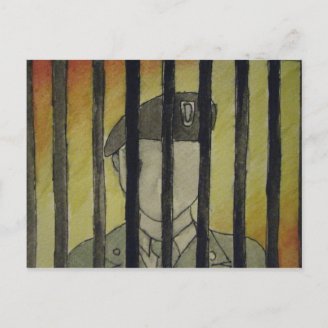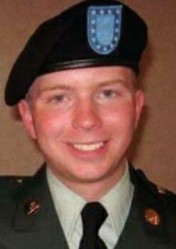 When military lawyers and Manning's civilian defense met at Fort Meade, Maryland, it was not the first legal proceeding in the case.
When military lawyers and Manning's civilian defense met at Fort Meade, Maryland, it was not the first legal proceeding in the case.
But it was the first time that Bradley Manning's own name had appeared on the witness schedule.
Until then, he had been kept out of sight (if not out of the public mind) in the brig, at Marine Corps Base Quantico, in Virginia, USA.
It was the conditions in which he was held there, which had prompted such a lashing from the United Nations. Under international law, it amounted to torture; and as signatories to the Convention Against Torture, the USA is not legally allowed to do that.
While a lot of American mainstream media seemed determined to frame Bradley Manning as a traitor to the nation, the way in which it played out lost a lot of credibility for the USA throughout the rest of the world.
It was a situation which proved unpalatable to some in the highest echelons of the US government. In April 2011, Chief spokesperson for the State Department, P.J. Crowley, resigned over the matter. He went on public record stating, "What is being done to Bradley Manning is ridiculous and counterproductive and stupid on the part of the department of defense."
His immediate supervisor, Hilary Clinton, accepted the departure with regret, telling the press, "PJ has served our nation with distinction for more than three decades, in uniform and as a civilian."
Shortly afterwards, nearly 300 academics - most of them top notch legal scholars - signed a review stating that, in their professional opinion, the treatment of Bradley Manning was unconstitutional. It breached the Eighth Amendment.
But none of this helped Private Bradley Manning, who was still on suicide watch in a 6 × 12ft cell. Where he had seen the sun for only 20 minutes during the previous nine months; and where he was stripped naked each night, standing with his legs apart, while a parade of guards walked by and inspected him.
It soon did indirectly help him though. As media attention escalated in the other direction, bringing the US government and military under increasing pressure to stop being the bad guys, then Private Manning was moved.
Days later, he was transported to the Midwest Joint Regional Correctional Facility, in Kansas, where he could enjoy a whole 80ft of space. He was also finally allowed to mix with other prisoners. Yet still there was no trial.
In the eyes of the law, Private Bradley Manning remains an innocent man, until proved guilty.



 When military lawyers and Manning's civilian defense met at Fort Meade, Maryland, it was not the first legal proceeding in the case.
When military lawyers and Manning's civilian defense met at Fort Meade, Maryland, it was not the first legal proceeding in the case. 

 The Sixth Amendment of the United States Constitution reads:
The Sixth Amendment of the United States Constitution reads:







 St Tydecho's Churches in West Waleson 09/03/2014
St Tydecho's Churches in West Waleson 09/03/2014
 Goodies for an Outlander Premiere Partyon 03/06/2015
Goodies for an Outlander Premiere Partyon 03/06/2015
 Holocaust Memorial Day Interview with Rainer Höss, Grandson of Rudolf Architect of Auschwitzon 01/24/2015
Holocaust Memorial Day Interview with Rainer Höss, Grandson of Rudolf Architect of Auschwitzon 01/24/2015
 Romantic Valentine Gifts for an Outlander Fanon 01/16/2015
Romantic Valentine Gifts for an Outlander Fanon 01/16/2015


Comments
That's likely to happen in March, unless it's determined that it can't go to trial after the end of this pre-trial.
I know that Manning's lawyer has said that military court is the best place for him. He reckons he will get a much fairer trial there than even in civilian courts.
I'm sorry to hear that this has brought your former colleagues into disrepute; but yes, it does appear that the whole world is judging this one (and the entire of the USA) accordingly.
Reading this is unsettling to say the least. When I hear or read academics and the United Nations accusing the U.S. of war crimes and torturing prisoners I simply do not know what to think. As an ole jarhead myself, I remember the UCMJ (uniform code of military justice) being the law of which U.S. Marines actions be held to account.
Therefore, what or who is to render judgment is this more about one world government, or one Marine standing accused of high treason. I do agree, judgment of this case is long overdue…
The man is due is day in military court.
It might be sophisticated, but it's not new. The Romans invented it. The first concentration camp was at Vindolanda, as part of Hadrian's Wall. It was used to house Britons. Bradley Manning is half Welsh, so his detention has a long historiography.
I'm also thinking of Gitmo.
When I read this, I'm reminded of some of the prisoners of Gitmo, and those who had to bear control orders in the UK. To me, this is just a barbaric, yet at the same time sophisticated, way of suppressing the voices of dissent.
There's a lot of talk at the moment about how military law and civil law are two totally different things. Yet they both have procedures. I should imagine that this high profile case is going to expose a lot of unsavory loopholes.
We're into day three now. I will be writing some follow ups, but Bradley is yet to testify. So far it's been officers from the brig and a doctor. David Coombs is owning them.
Wow.
Sadly, I almost totally forgot about this until I saw this article. :/